- Home
- Lloyd Jones
Biografi Page 2
Biografi Read online
Page 2
4
IN A NUMBER of ways the Balkans had obtruded into my world. My summers had been spent in a place called Kansas Street in the Wairarapa, New Zealand, where my uncle had as a neighbour Cliff Dalziel. ‘A talented man’, it was often said of Cliff, but ruefully, as though the promise of Cliff ’s talent had coved off to disappointment.
Cliff was a shortwave radio operator. All his waking hours were spent in a shed playing with his radio gear. There was no boundary fence or hedgerow to speak of, and summer evenings I lay in the dry straw-like grass eavesdropping on Cliff while he worked his dials through the clouds of static, waiting for him to hit a pocket of sound, so pure and near that it often felt as though the voice of Radio Tirana had arrived at the bottom of the Pacific from the other side of a wall in a cheap motel room. Sometimes we heard Albanian or Greek music wavering out of Cliff ’s shed. The song grew dim and faded and the static returned. Cliff would chase after it and try to woo it back with the dials but the song was gone. Then, maybe, the announcer’s voice would come through strong—it was ninety-two degrees in Tirana. An astounding heat which I associated with older civilisations. In our part of the world heat got tossed around by winds twisting out of valleys and rushing across farmland.
I lay back on the lawn trying to imagine a heat that came out of a kiln. Then the voice from Tirana vanished inside a thin whistle out to the stratosphere, and from inside the tin shed I heard Cliff read out the time on his wristwatch: ‘Eight-thirty, February nine, nineteen hundred and sixty-three.’ The transmission was recorded in a school exercise book which he carried to and from the shed.
There was a national league for shortwave radio buffs. Cliff had cartons full of QSL cards—these were verification cards— from the Venezuela telephone system, from a German institute of physics; he once showed me a slightly terse letter from the Israelis reminding Cliff that ‘their transmission was not intended for reception by the general public’. A 1970 letter from Radio Peking provided Cliff with a proud moment. The letter read: ‘Thank you for your letter and your congratulations to our country on the successful launching of the first man-made earth satellite…Our great leader Chairman Mao [has] pointed out, “The era in which Chinese were regarded as uncivilised is now over”.’
Cliff said he wasn’t competitive about it, although within the league and amongst some members there was quite a bit of argument as to what was or wasn’t a country. To earn points you had to tape a transmission. The champion shortwave radio operator with virtually an unassailable lead was a blind man who lived with his elderly sister at the bottom of the South Island.
For Cliff it had started out during the war, when he was a ship’s radio officer sailing in the Adriatic. Each night he listened in to ‘fellco radio’, used by the partisan groups inside Albania and Yugoslavia. After the war he wrote to those countries on whom he had eavesdropped—and with what I imagined to be a pen pal curiosity, Albania had written back.
For twenty-eight years Cliff monitored Radio Tirana’s broadcasts. The clearest signal was the daily broadcast, which was aimed at America but which sometimes overshot to land in the Pacific.
But Cliff had also taken it upon himself to expand his duties to other things.
For nineteen years he paid rent on a small shop display in the world trade centre. The Soviets also had a prominent but largely ignored window front. Mothers with prams lost in the maze of the centre’s corridors and wings suddenly found themselves confronted by Cliff ’s Albanian window: dolls in folk costume, a bottle of raki, a plastic bunch of grapes. And for a colourful backdrop Cliff had mounted on display boards photographs of women in white cotton headdresses working in the fields. Lean, healthy-looking farm workers waved from the seats of tractors. Happy miners waved back along dark and narrow mine shafts.
Cliff and his wife, Bess, had a daughter and a son. We had not been close. I knew only the daughter’s name, Grace. A crucial five or six years separated us. Her older brother left home and Grace was gone less than eighteen months later. My memories are of Grace studying till all hours, and of the bright halo her desk lamp created in the window. Once Grace left, it felt as though the Dalziel children had simply passed on to another world. I never saw them or heard them mentioned by their parents.
Driving to Cliff ’s place, after all these years, I couldn’t think of the son’s name. But as I pulled up outside the Dalziel house, in another part of my memory I saw him quite clearly—eighteen or nineteen years of age he must have been, standing outside his house and staring in the windows unsure as to whether he had locked eyes with a friend or a stranger.
I parked and spent a moment looking at my uncle’s old house. Smaller, plainer than I had remembered. The new owners had let the garden go. On Cliff ’s side of the boundary the tin shed was gone, although a very tall radio aerial rose at the side of the chimney.
I was intending to go to Tirana and I had a manila folder of photographs to show Cliff—of young men, naked to the waist, dragging themselves from the water in the Albanian port of Durrës. There was a boat going to Italy and everybody wanted to be on it. In the photographs people cling to the sides of freighters. Others are climbing up ship ropes. There is one photograph of a woman with a baby tied to her belly; she is hauling herself and the child, hand over hand, up the rusted side of a freighter. The harbour is white with splashes. According to the photographs, bodies fall like torpedoes—resignedly and without fuss. Among the crowd gathered on deck there is no excitement. There doesn’t appear to be any backslapping—or even the ‘Thank God, we’ve made it’ sentiment which you might expect. Instead, the crowd in this photograph reminded me of high jumpers, successful so far, but for the moment content to sit on their haunches to see who else will make it.
The other Reuters photographs were of exhausted men and women resting on a mountain pass high up in the winter snow and ice of the Pindus mountains. Men, women, children, small babies swaddled in blankets, walking the ‘freedom corridor to Greece’.
Cliff was dismissive. The photos were of ‘good-time boys wanting jeans and discotheques’. The country was in the hands of reactionaries. Everything had gone to hell.
He spoke of the country falling to saboteurs, foreign agents, Fascists. Extravagant language which pressed the buttons to another era—to grainy films of the forties, of smoky rooms, women with obscure accents, troubled intellectuals who dabbled in explosives. And yet Cliff was none of these things. The last time I had had a studied look at him was two years previously. A photo had appeared in the local newspaper of Cliff staring gravely back at the community. In the foreground was a cake with lit candles to mark the woodwork teacher’s retirement. It was a straightforward head and shoulders, but you knew there was a flat carpenter’s pencil stuffed down the inside of his walk socks. I also seemed to recall a scar on his knee from a brush with a lathe. Most of all, you sensed that the frosty distance between the blackboard and the first row of desks would accompany Cliff into private life. It had to do with his bushy eyebrows, I think. His eyes, sheltered underneath that stiff ridge, gazed out over the classroom, suspicious, and forever sensing laughter behind his back.
Bess, Cliff ’s wife, pushed open a door into the side of the house and called out, ‘Cliff…You have a visitor.’
She leaned around the door as if reluctant to enter. ‘Shall we say fifteen minutes?’ Then to me: ‘I bought a leg of lamb especially.’
Cliff emerged from the gloom of the hurricane lamps which lit small areas of bitten and scraped clay banks. He waited until the footsteps of his wife climbed out of earshot, and he said disapprovingly, ‘She prefers it up there to down here.’
At the far end of the basement there was a bed, some expensive electronic gadgetry, a table and a chair with a stiff back. Along one wall were plastic clothes baskets piled high with back copies of Albania Today and summarised news bulletins from Tirana published in English for the foreign readership.
But back at the door Cliff was studying my feet. He said I
might like to pull on a pair of house slippers, or jandals. There was a pile of them at the door. I would be much more comfortable, he said, and in such a way as to suggest that non-compliance carried the weight of a cultural slight.
He found me a worn pair of green jandals. ‘There,’ he said, happy.
‘Chai?’ And he busied himself with lighting a Bunsen burner. ‘Go ahead. Look around.’
On his table was a copy of the DX Times. He had underlined some references to himself in the editor’s chatty ‘Mailbag’ column. ‘Cliff, we’re getting around this month…From up in the tropics Cliff has heard from one he describes as Vientiane and the Voice of Afghan 17540…Some really unusual ones here, Cliff. Nice work. Ed.’ Another section, ‘Shortwave Bandwatch’, listed the reception details sent in by league members—the kilohertz, the country and program: 3385, Papua New Guinea, East New Britain, ‘drumming and singing…’; Papua New Guinea, New Ireland, ‘Linda Ronstadt singing…’; Dubai, ‘the war in the Gulf and light music…’
Cliff glanced at his watch. ‘Right now,’ he said, ‘Radio Tirana should be broadcasting to Africa.’ He poured the tea, then he reached over to his dials. A moment later came the familiar static cloudburst. Then, Tirana…
Later, when I surfaced from this world, I was greeted with the rolling calm of Kansas Street, its tidy space and tripwire fences. Islands of tall maize grew wild around the fence posts where the mowers couldn’t get close enough, and it occurred to me, not for the first time, that here in the South Pacific were bits and pieces of another world poking through, a piece of the prairie that had taken seed from our imagination.
5
THE FEW THINGS I knew about Albania then I had gleaned almost entirely from Cliff. It was around the time of the revolution sweeping Eastern Europe that my interest re-emerged. At the tail end of the massive crowd scenes in Prague and the wintry loneliness of a broken East German Party leader walking in the woods of a Russian asylum came the grainy blue television pictures of a street mob in Tirana.
I moved forward to the edge of my armchair as one of the mob broke clear. This renegade looked like an extra in an Elia Kazan movie—ill-fitting trousers of a rough kind of denim and something like a black pea jacket and a peaked cap. A rope was tied around his waist, and as he stepped onto the statue’s knees, those at the rear of the mob raised a cheer.
Now the young man stretched for the dictator’s breast pocket. He took purchase and swung freely. The crowd moved involuntarily forward, but the young man was able to clinch with his legs and grab the bronze neck, to which he fastened the rope. From here the coverage jumped forward. The screen filled up with the face of a reporter, and over his shoulder, high up in the picture, groups of men were urinating over the fallen idol.
A few months later, in Rome, the first Albanians I meet are some of those figures I had seen in the photographs dragging themselves out of Durrës harbour, clambering up the sides of ships. Short, humble figures like the ones I remember from old school photographs of men in the twenties felling timber to clear farmland. Men amused by any special attention given them.
A need for birth certificates and other documentation has brought them back to home soil, but for so large a group their silence is chastening.
The Albanian consulate is hidden behind high walls, and from via Asmaria you can’t see the tall elegant trees, the sweep of lawn or the circular drive. There is an entranceway of perhaps half a dozen steps cut from stone, but once you are inside the door the grandeur falls away and you find yourself at the threshold of another world, one which has made a virtue out of neglect.
In the gloomy hall and waiting room the light bulbs haven’t been replaced and the wallpaper has started to sag out from the wall. A shabby blue cotton shift sits loosely over a couch. Four young men perch on the edge and rise nervously to their feet whenever consulate officials in overcoats make brief appearances. It starts out orderly, but the moment pieces of paper are produced, everyone begins talking at once and the off icials simply don’t want to know about it. They wave their arms and retreat behind closed doors, and there they remain until the consulate closes at noon.
This was the case on Saturday. On Monday the halls and lobby are deserted—it’s an entirely different place—and a man in a dapper suit and with polished English says, ‘You would like to visit Albania. Yes, why not.’
Two days later, in Bari, I’m standing at the stern of a ship watching the procession of secondhand cars crammed with food and clothes and electrical appliances enter the hold.
Already we’re an hour late in leaving and another dozen cars are still on the wharf. The drivers check that the ropes holding down fridges and televisions on the car roofs are secure. They can’t check this enough times. The overwhelming concern is for practicality, which is the kind of thing Cliff would warm to. For the first time on this trip I can actually place him. One driver has removed his shoes and another driver is examining their heels. Cliff would have an opinion on such things.
Just two cars left now. An announcement that the bar has opened clears the decks. A little later the ship gives a shudder, and down on the wharf three Italian officials in black uniforms rock back on their heels with the satisfaction of a difficult job at an end. There are no other farewells. I stay out there until one by one the lights go out along the Italian coast.
In the night something like a cold hand touched my cheek and I felt Albania reach out—a cold puff of wind sent down from those tan-coloured mountain peaks which, for a moment, I can’t think where or how they have come to mind. Of course, I’m thinking of Syldavia from the Tintin books.
The lounge is quiet as a morgue—men in socked feet lie back with their mouths open. The ship feels like a giant crib rocking gently in the swell.
Out on deck there is a full yellow moon, and briefly, I think I have it all to myself. The next thing I see is the lit end of a cigarette, and here he comes, a lone figure shuffling from the doorway of the saloon. He takes a few steps and stops, to hold his position against the pitch and roll of the ship; then he sets off again.
He stops short of me with his pissed-pants stance. ‘Allemagne?’ Then he tries something in Italian which I fail to pick up. He shakes his head, and in perfect English he says, ‘I asked if you were Russian.’
His name is Mister Jin, although this comes later.
I tell him I am visiting Albania.
‘Well yes,’ he says. ‘We all are. This is where the ship is destined, surely. But you are not Albanian.’ Then he asks that I forgive his rudeness, but he is unaccustomed to such a phenomenon. ‘Why would anyone visit Albania?’ he wonders. ‘Perhaps you are a spy? In Albania there is hardly anyone who isn’t a spy.’
He waits to see what I think of that—instead, I congratulate him on his English. And he laughs loudly and heartily, a laugh which smells strongly of alcohol.
‘Allow me,’ he says, ‘to introduce you to one of my closest friends…’ From the inside of his coat he produces a bottle of Greek brandy.
He is returning home from visiting his son in Italy, and this being his first time abroad, I am curious to hear his impressions. Was it everything he had expected? But he answers by saying his son is very happy there.
‘His life is very satisfactory. Very satisfactory,’ he says.
We drink to that, and Mister Jin suddenly begins to sing.
‘Row, row, row your boat Gently down the stream…’ He asks if I know this particular English song.
Then, with passable sincerity, he says he has one or two questions on his mind. There are some things he would like to know about my country.
‘Did you fight against the Nazis in the war?’
‘Do you possess the grape—and grow corn?’
‘Is it a prime minister or a king that you have?’
‘Do you have black people?’
‘It is coming into summer there, I believe. Do you like to swim? My personal preference is to frogkick.’
‘Oh dear,’ he says merri
ly. He checks himself. ‘That is also an English colloquialism, yes, this is a fact? Good, I am satisfied.’
‘So why, my friend, what has brought you to Albania?
‘Ah, you are a writer. This is good. This is very good indeed.
‘Ismail Kadare. You know him? Excellent. But you must read Dossier H. To understand the tragedy of my country this is the book.’
‘I’ll look out for it.’
‘Ah, but naturally you will not find it in English. So I will tell you.
‘First,’ he says, ‘you must understand. Information and genealogy are everything in Albania. Under Hoxha there was no other reality. You understand?
‘Under Hoxha, everyone had to write out their biografi. Each year it was to be updated and added to—information such as: Have you been turned down by the Party? Was your father a partisan? Were your grandparents Zogists? Or collaborators? Your biografi would tell.
‘The story Kadare wrote was of two Englishmen who have come to Albania to research an academic work on Homer. Our secret police are immediately suspicious. Who is this person Homer? What does he want? Is he a collaborator? A foreign agent? We must find out. So, a sigourimi is sent to spy on the Englishmen. He eavesdrops. He learns the questions the Englishmen ask. And eventually a dossier emerges on this foreign agent…this saboteur called Homer. You understand?’
I mention my interest in Hoxha, although the word I use is ‘dictator’ and Mister Jin reacts with mock surprise.
‘“Dictator”, you say. “Great Leader”, we said.’
Enver Hoxha, he continues, had been a religion.
‘Even I. I was very, very sad when Enver died. At my office no one was brave enough to mention his death. We didn’t dare speak for what might come out. This is a fact. Imagine, please, if we said the Emperor was dead and he turned out not to be? We waited for the radio report before we could speak of his death. Some had cried with genuine grief, others cried because they thought it dangerous not to. Some turned white believing something catastrophic would happen. The crops would shrivel and die. The seas would rise. They would be obliged to walk on stilts.

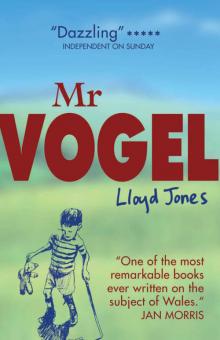 Mr Vogel
Mr Vogel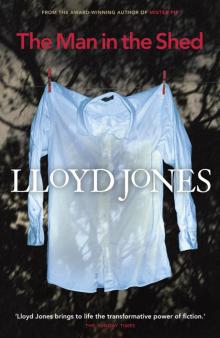 The Man in the Shed
The Man in the Shed Mister Pip
Mister Pip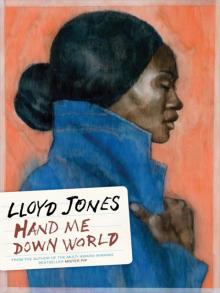 Hand Me Down World
Hand Me Down World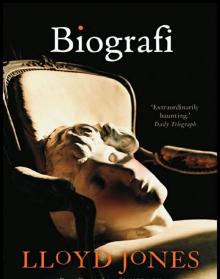 Biografi
Biografi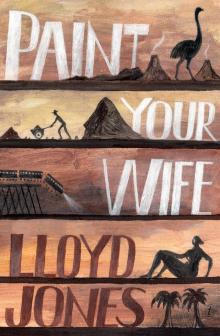 Paint Your Wife
Paint Your Wife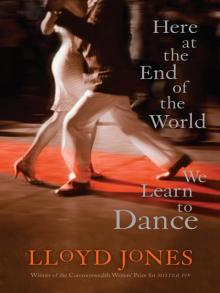 Here at the End of the World We Learn to Dance
Here at the End of the World We Learn to Dance My First Colouring Book
My First Colouring Book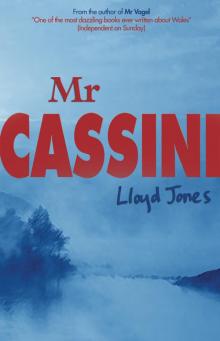 Mr Cassini
Mr Cassini See How They Run
See How They Run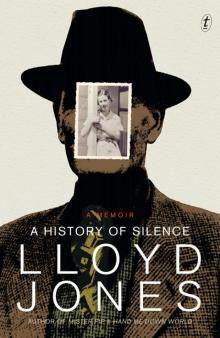 A History of Silence
A History of Silence The Book of Fame
The Book of Fame